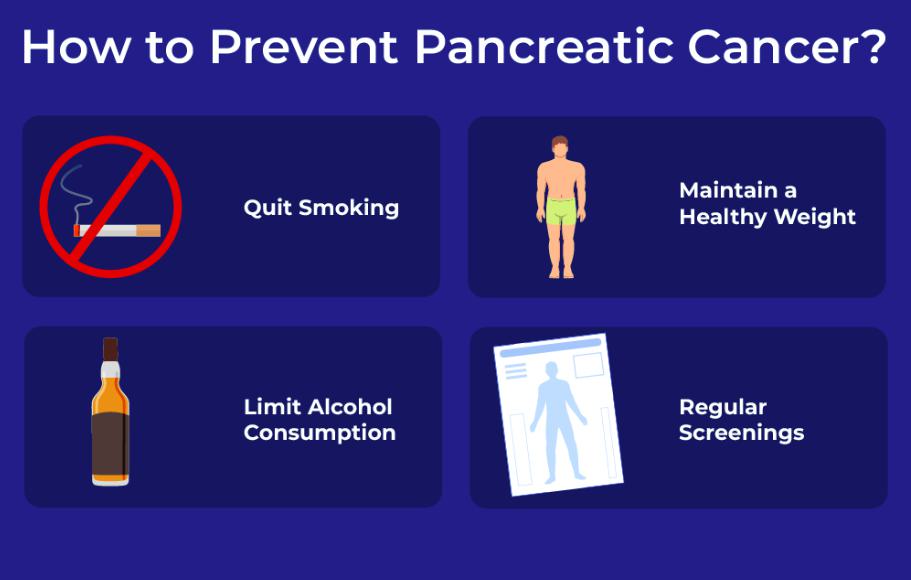Pancreatic cancer is one of the most challenging forms of cancer, often diagnosed at a late stage due to its subtle early symptoms. Because it is associated with high mortality rates, prevention and early detection are key factors in reducing the risk and improving outcomes. Understanding how to prevent pancreas cancer is crucial not only for those with a family history but also for anyone looking to adopt a healthier lifestyle.
This article will guide you through everything you need to know about pancreatic cancer, including its definition, types, causes, symptoms, diagnosis, treatment, and most importantly, preventive measures. By learning more about how to prevent pancreas cancer, you can take proactive steps to protect your health and lower your risk.
Definition and Overview
Pancreatic cancer occurs when malignant cells form in the tissues of the pancreas, a gland located behind the stomach that plays a vital role in digestion and blood sugar regulation. It is considered one of the most aggressive cancers due to its rapid progression and difficulty in detection.
Types of Pancreatic Cancer
There are two main types of pancreatic cancer:
- Exocrine tumors: The most common type, including adenocarcinoma, which originates in the ducts of the pancreas.
- Neuroendocrine tumors: Less common and generally slower-growing, arising from hormone-producing cells.
Causes and Risk Factors
The exact cause of pancreatic cancer is not always clear, but several factors increase the risk, such as:
- Family history of pancreatic cancer
- Smoking and heavy alcohol consumption
- Obesity and poor diet high in red or processed meats
- Chronic pancreatitis
- Type 2 diabetes
- Advancing age, particularly over 60
Symptoms and Early Warning Signs
Early detection is difficult because symptoms often appear late. Warning signs include:
- Unexplained weight loss
- Persistent abdominal or back pain
- Loss of appetite
- Jaundice (yellowing of skin and eyes)
- Digestive problems such as nausea or bloating
- New-onset diabetes in older adults
Diagnosis
Doctors use various diagnostic tools to detect pancreatic cancer, including:
- Imaging scans (CT, MRI, or ultrasound)
- Endoscopic ultrasound (EUS)
- Biopsy to confirm cancerous cells
- Blood tests for tumor markers such as CA 19-9
Treatment Options
Treatment depends on the stage and type of pancreatic cancer. Options include:
- Surgery: Whipple procedure or distal pancreatectomy
- Chemotherapy: To kill cancer cells or shrink tumors
- Radiation therapy: To target specific areas of cancer spread
- Targeted therapy and immunotherapy: Advanced treatments to improve outcomes
Prevention and Lifestyle Recommendations
Learning how to prevent pancreas cancer involves adopting healthier lifestyle choices and minimizing risk factors. Effective steps include:
- Quit smoking and avoid excessive alcohol use
- Maintain a healthy weight through regular exercise and balanced diet
- Eat more fruits, vegetables, and whole grains
- Limit red and processed meats
- Manage diabetes and chronic conditions properly
- Get regular medical check-ups if you have a family history
Prognosis and Survival Rates
Pancreatic cancer often has a poor prognosis, with survival rates varying depending on the stage at diagnosis. Early detection significantly improves chances of survival. For localized cancer, the 5-year survival rate is much higher compared to advanced stages.
Latest Research and Innovations
Medical research is ongoing to improve early detection and treatment options. Innovations include:
- Liquid biopsy tests for early screening
- Personalized medicine based on genetic profiling
- Immunotherapy drugs targeting tumor-specific pathways
- Clinical trials offering access to advanced treatments
Coping and Support for Patients
A pancreatic cancer diagnosis can be emotionally and physically overwhelming. Support groups, counseling, and palliative care play vital roles in helping patients and families cope. Staying informed, maintaining hope, and seeking a strong support system are essential.
Conclusion
Understanding how to prevent pancreas cancer is about making conscious lifestyle choices and staying vigilant about risk factors. While not all cases are preventable, proactive steps such as maintaining a healthy diet, avoiding tobacco and alcohol, and seeking regular medical advice can lower your risk. Early detection and continuous advancements in research give hope for better outcomes in the future.
FAQ
1. Can pancreatic cancer be prevented completely?
Not entirely, but risk can be reduced through lifestyle changes and regular screenings.
2. Who is most at risk of developing pancreatic cancer?
People over 60, smokers, those with obesity, chronic pancreatitis, or family history are at higher risk.
3. What foods help prevent pancreatic cancer?
Diets rich in fruits, vegetables, whole grains, and lean proteins are recommended.
4. Is pancreatic cancer hereditary?
Yes, about 10% of cases are linked to genetic mutations or family history.
5. How important is early detection in pancreatic cancer?
Extremely important. Early detection can significantly improve treatment options and survival rates.

